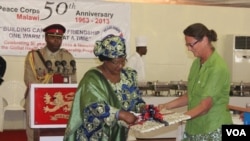BLANTYRE, MALAWI —
In Malawi, the United States government has embarked on a three-year effort to increase human resource capacity for the country's health sector. The Global Health Service Partnership Program comes as the US Peace Corps celebrate 50 years of work in the Malawi.
The program is a public-private collaboration of the Peace Corps, the President’s Emergency Plan for AIDS Relief (PEPFAR) and Seed Global Health. The NGO sends nurses and doctors abroad to be medical educators.
Vanessa Kerry, the chief executive Officer for the organization, describes the country's health needs.
“It has a very high maternal mortality rate with 460 mothers die for every 100,000 live births compared to the United States where only 21[mothers] die for every 100,000 live births," she said, "and we know that with simple intervention we can change that.”
The program – the first of its kind by US Peace Corps in Malawi – will provide health experts to teach in public colleges and universities.
Carrie Hessler-Radelet, the Peace Corps Acting Director, said the Global Health Service Partnership Program volunteers will be in class working with fellow professors to teach clinical officers, doctors and nurses on various topics. They'll also be doing on-the-job mentoring and clinical supervision.
She said the first 11 American doctors and nurses now in the country will be replaced by fifteen others after a year.
She said five physicians have been assigned to teach at the University of Malawi’s College of Medicine, four nurses at Kamuzu College of Nursing, and two nurses at Mzuzu University.
Speaking during the official launch of the program, Malawi President Joyce Banda said the effort aims to alleviate the shortage of trained health workers in the country.
“The World Health Organisation recommends the minimum of 23 health workers per 10,000 people to provide the most basic health coverage," she said, "but in Malawi we have fewer than four workers per 10, 000 people.”
The program is a continuation of the Peace Corps’ long relationship with Malawi that began when the first 20 volunteers arrived in early 60’s to teach in secondary schools.
Today, there are 141 volunteers working in education, environment and health sectors.
President Banda has hailed their contributions.
“The Peace Corps was one of the pioneers in 1992 of community based HIV /AIDS prevention activities in rural Malawi," she said. "This pilot project was so successful that the first standalone HIV/AIDS project in the Peace Corps world was established in Malawi in 1993. Volunteers in this project worked side by side with district AIDS coordinators across the country.”
The Global Health Service Partnership Program has also been introduced in other two African countries of Tanzania and Uganda.
The program is a public-private collaboration of the Peace Corps, the President’s Emergency Plan for AIDS Relief (PEPFAR) and Seed Global Health. The NGO sends nurses and doctors abroad to be medical educators.
Vanessa Kerry, the chief executive Officer for the organization, describes the country's health needs.
“It has a very high maternal mortality rate with 460 mothers die for every 100,000 live births compared to the United States where only 21[mothers] die for every 100,000 live births," she said, "and we know that with simple intervention we can change that.”
The program – the first of its kind by US Peace Corps in Malawi – will provide health experts to teach in public colleges and universities.
Carrie Hessler-Radelet, the Peace Corps Acting Director, said the Global Health Service Partnership Program volunteers will be in class working with fellow professors to teach clinical officers, doctors and nurses on various topics. They'll also be doing on-the-job mentoring and clinical supervision.
She said the first 11 American doctors and nurses now in the country will be replaced by fifteen others after a year.
She said five physicians have been assigned to teach at the University of Malawi’s College of Medicine, four nurses at Kamuzu College of Nursing, and two nurses at Mzuzu University.
Speaking during the official launch of the program, Malawi President Joyce Banda said the effort aims to alleviate the shortage of trained health workers in the country.
“The World Health Organisation recommends the minimum of 23 health workers per 10,000 people to provide the most basic health coverage," she said, "but in Malawi we have fewer than four workers per 10, 000 people.”
The program is a continuation of the Peace Corps’ long relationship with Malawi that began when the first 20 volunteers arrived in early 60’s to teach in secondary schools.
Today, there are 141 volunteers working in education, environment and health sectors.
President Banda has hailed their contributions.
“The Peace Corps was one of the pioneers in 1992 of community based HIV /AIDS prevention activities in rural Malawi," she said. "This pilot project was so successful that the first standalone HIV/AIDS project in the Peace Corps world was established in Malawi in 1993. Volunteers in this project worked side by side with district AIDS coordinators across the country.”
The Global Health Service Partnership Program has also been introduced in other two African countries of Tanzania and Uganda.





